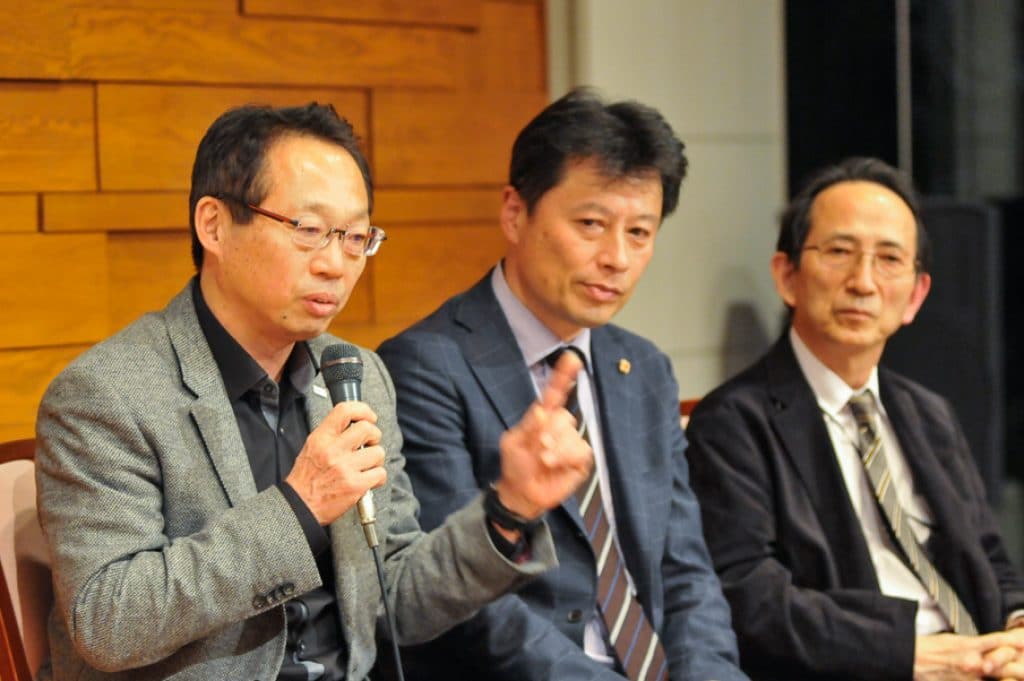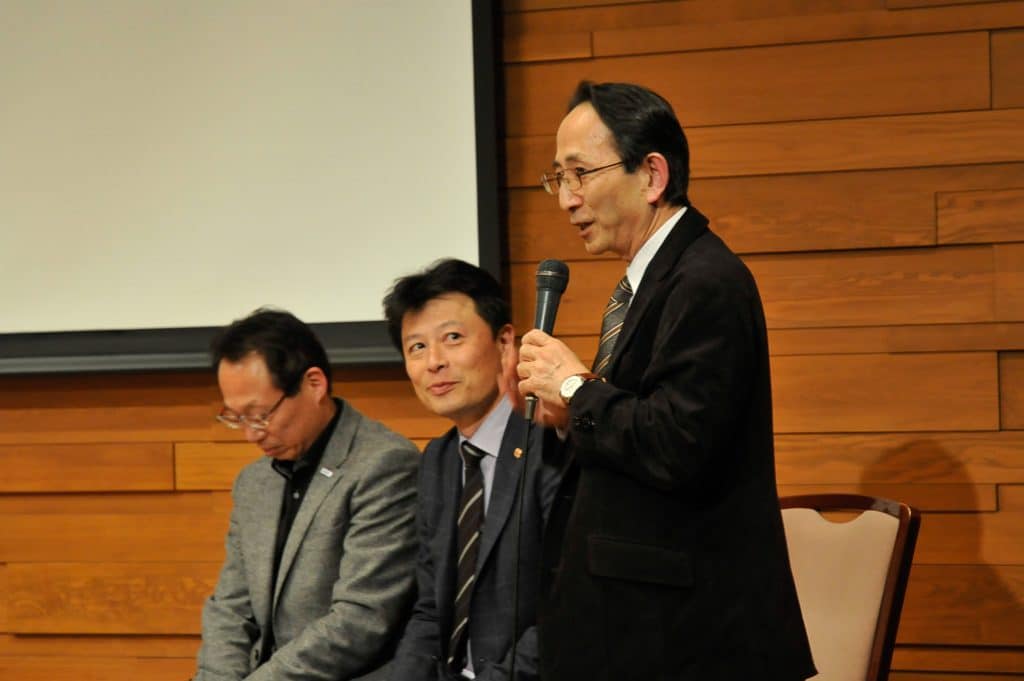
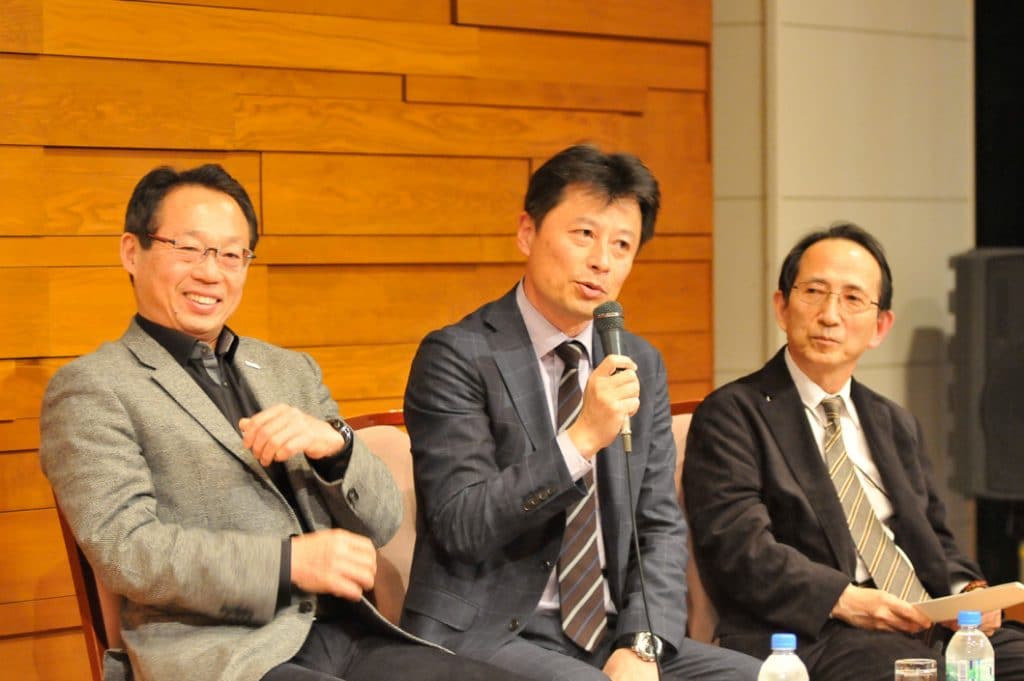
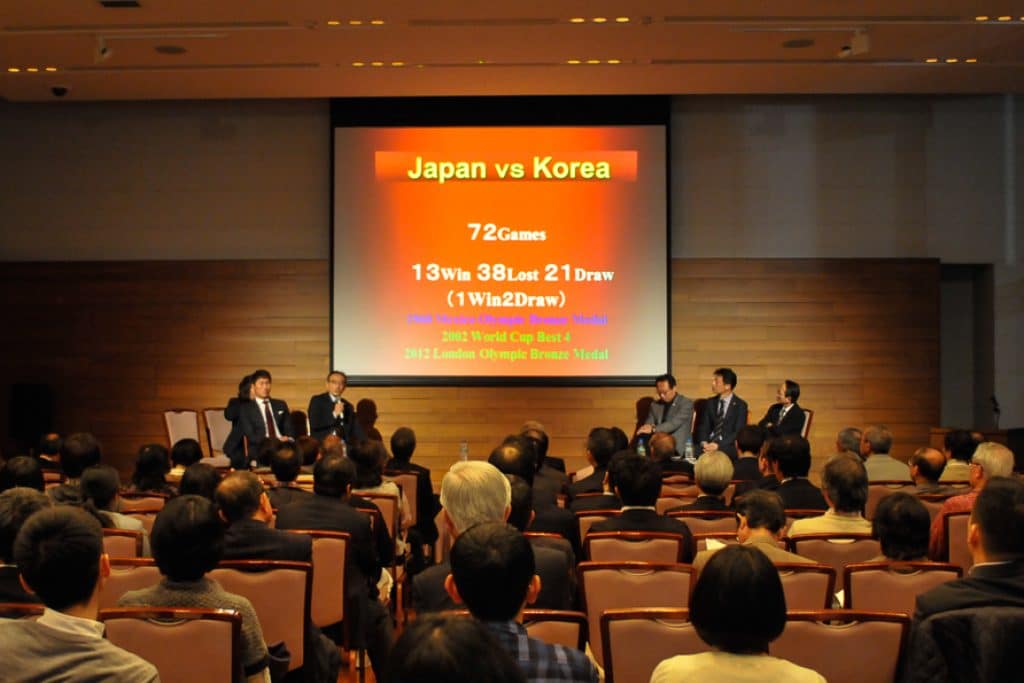
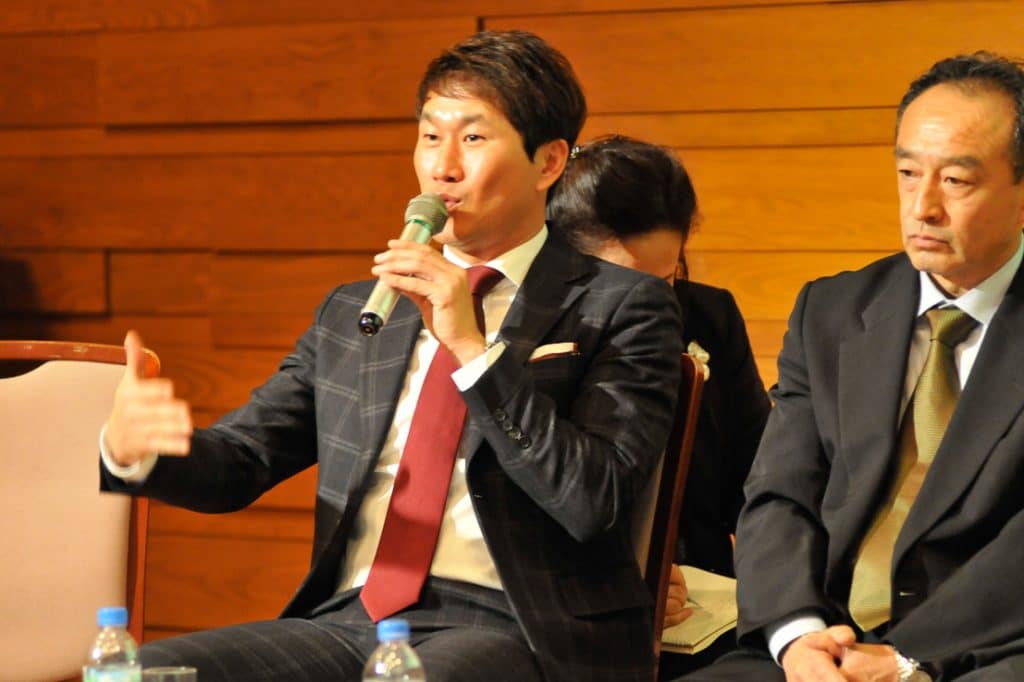
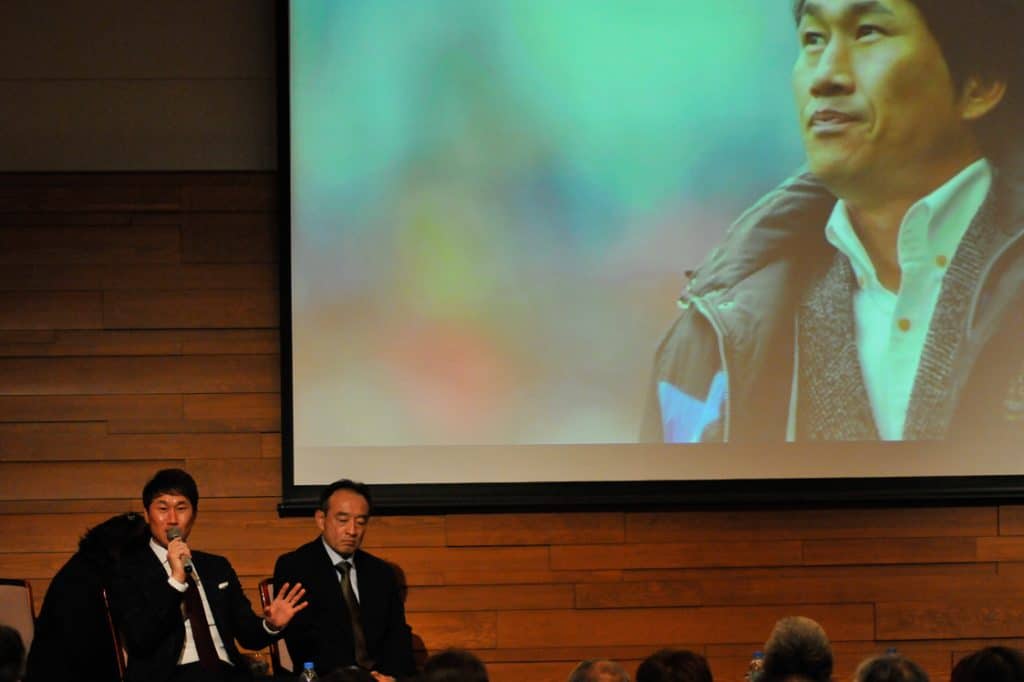
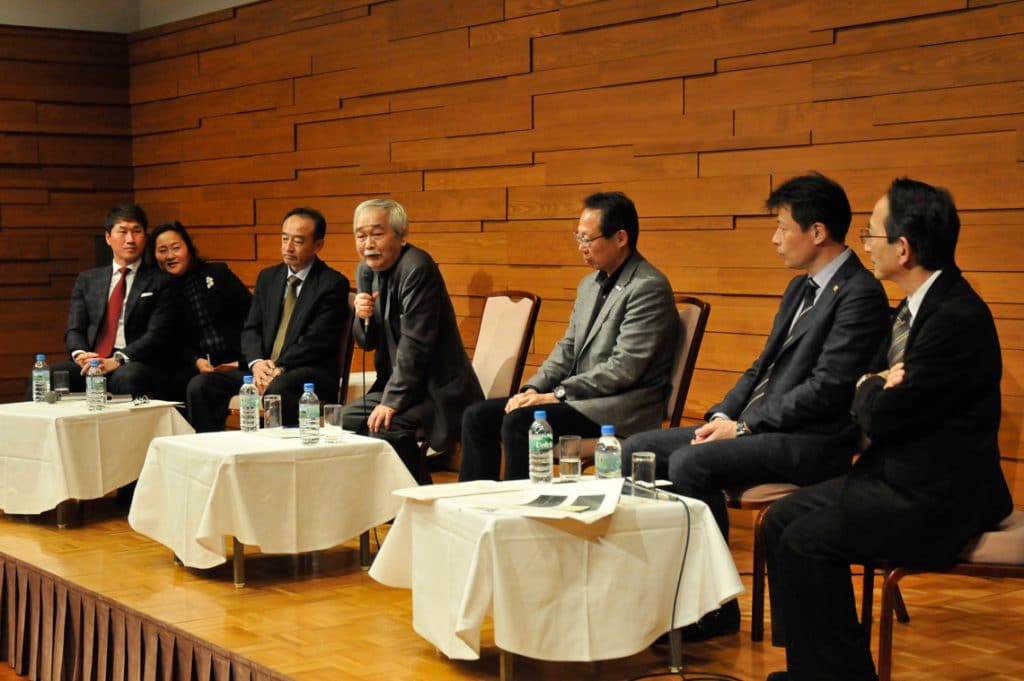
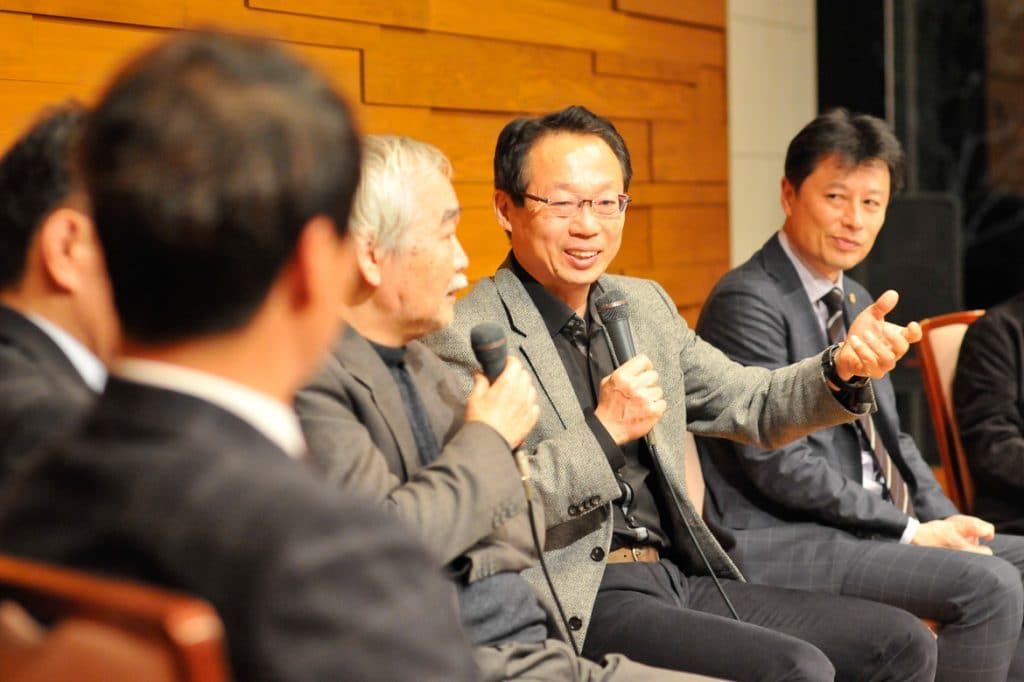
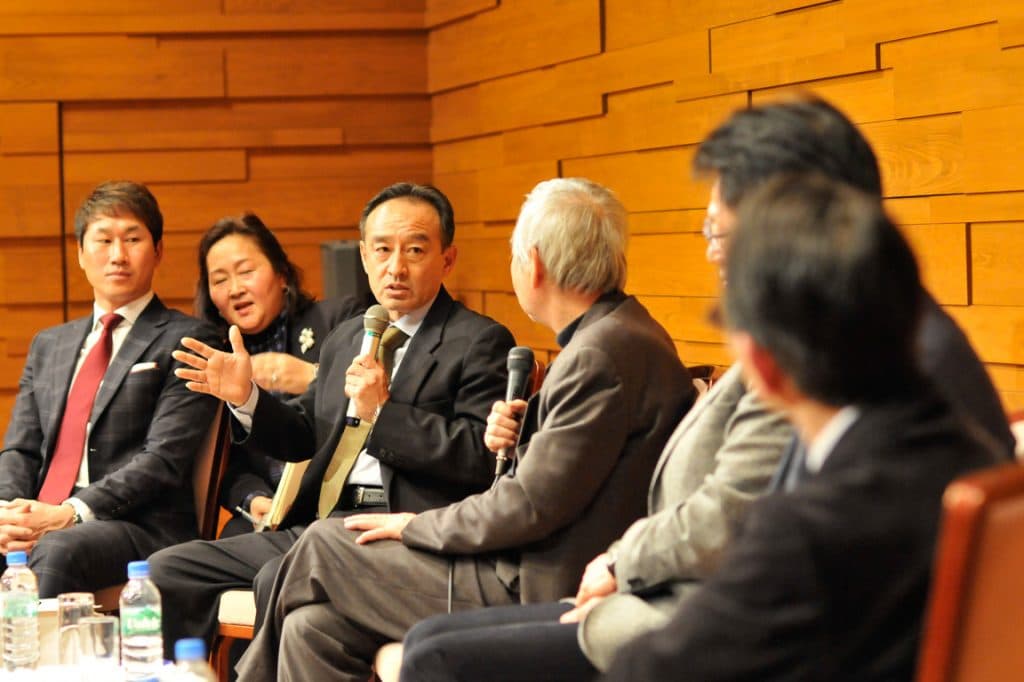
Session 1
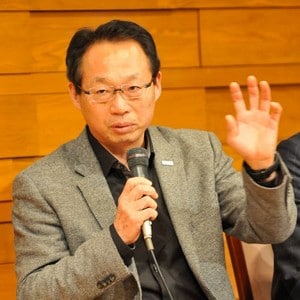
Takeshi Okada “A society that values intangibles like trust and respect is coming.”
Sang-chul was a player for the Yokohama F Marinos when I was coaching there, and I believe that it is thanks to him that we won the J-League championship. When we were up against the SeongNam Football Club—who had defeated us before—in the 2004 AFC Championship League, he inspired us to win by shouting, “Are you really okay losing to the same team twice?!”
Moving to China was a new challenge for me. I went to China to see if the China portrayed in the Japanese media was an accurate representation. However, when I actually went, I realized that the impression that I had gotten of China in Japan was completely different from the reality. In the two years that I was in China, I never had a single unpleasant experience. At the stadium, supporters come with signs of my face and support the team. And when I retired and was headed back to Japan, 60 supporters came to the airport and asked me in broken Japanese to stay.
Images of Japanese supermarkets being set on fire in China are played over and over in Japan, but there are many stores that haven’t been attacked. While the Chinese do not necessarily feel kindly toward Japan because of anti-Japanese education, I believe that 80 to 90 percent of Chinese people do not have any ill will toward Japan. Also, given the one-child policy, there isn’t a single Chinese parent that wants to send their only child to war, which is a sentiment that the Japanese share. I have three children, and when I think about what I want to pass on to them, I want to give them a better society, not the burden of environmental or economic problems. For that reason, I hope that through our ties as “soccer friends,” we can contribute to a more peaceful world. Sang-chul is a great friend, and when I go to China, the players still run to greet me. I believe that someday we will have a society where we will value these types of intangible assets—trust, respect, and friendship.
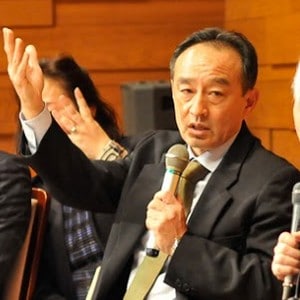
Seigo Ikeda “History can’t be changed, but we can change what we pass on to the next generation.”
My career in Korea began in 2007, when I received an offer to be the conditioning coach for a team there. I couldn’t believe that Korea, a rival, could need the services of a Japanese person like me. The first time I stood on the pitch, I was incredibly nervous, not knowing how the players would react, but they welcomed me. When Hong Myung-bo became the manager of Korea’s U20 team in 2009, he asked me to work with him. I knew him well from his days in the J-League, and one time when we were out for dinner, he had said to me, “If I become a manager, you’ll be my physical training coach, right?” I had answered that of course I would help him, and he held me to my word.
Japan’s record against Korea is 13 wins, 38 losses, and 21 ties. Considering this record, it is natural that Korea is considered a team that the Japanese don’t want to lose to. I participated in a Japan vs. Korea match when I was a student and there was one thing that has remained with me since that time. Before matches, players’ shoes are checked to ensure that their spikes aren’t sharp, but there was one Korean player who had on illegal spikes. Due to time and language constraints, he entered the game with the illegal shoes on and I was assigned to mark him. Within 20 minutes, I had scratches from his shoes all over my legs. At that time, I felt like Korean players will do anything to win.
So, considering that unpleasant experience, why did I work as a coach of Korea’s national soccer team? There were three reasons. One was that I want to raise the soccer level in Asia. Presently, there are no top-seeded Asian teams in the World Cup and I wish to change that. In order to do so, Japan and Korea will need to work hard. The second reason is that, while we can’t change history, we should be able to change what we pass along to the next generation. I believe in the friendship between Korea and Japan. There was a Korean community near where I grew up, and my father always taught me, “Koreans and Japanese have to work together. Judging people based on skin color or nationality is wrong.” That belief is still deeply rooted in me. The third reason is Hong Myung-bo himself. When he became the head coach of the Korean U20 national team, I was working for Coach Okada in China, and he came to visit us there. And when he invited me to work for the U20 team, he went to my club himself to get my release. My first tournament as a U20 staff member was a Japan-Korea match. Before the game, he encouraged the players by saying, “Let’s respect Japan! It’s because of our rivalry that we have gotten this far, so let’s give our all in today’s match and win. Let’s win fairly. There’s more meaning in winning fairly.” I believe that a person like this can overcome the boundaries between our countries and create closer ties between Japan and Korea.

Yoo Sang-chul “Don’t speak about things you haven’t experienced.”
When I first started playing in Japan in 1999, it was my first time playing abroad, and there was a language gap, so I felt a lot of pressure and nerves. I was especially worried since I remembered the tension when I played in a national team gave against Japan in the past. Japan and Korea are rivals, but that rivalry has spurred the development of soccer in both countries.
I played in the J-League for six years and had I not played in Japan, I would have never come to understand the depth of bonds between people. It is said that Japan and Korea are close yet distant countries. In fact, I was also worried when I first came to Japan and harbored antipathy and wariness toward Japanese players. I didn’t even think about getting close to them. I am an athlete so I tried my best not to lose and to never give up no matter how badly we were losing. During that time, my teammates came to understand me and I was able to open my heart to them little by little. I started to really enjoy my time playing in Japan. I sometimes have a chance to come back to visit Japan, and when I’m here, especially in Yokohama, I feel like it’s my second home.
What I want to share from my experience in Japan is, “Don’t speak about things you haven’t experienced.” Actually experiencing things and communicating with others is how you can understand their feelings and thoughts. Therefore, I think that exchanges among Chinese, Japanese, and Koreans are great. Deepening Japan-Korea ties in soccer can have an impact on economic and social ties and can help our two countries grow together. I hope we can pass that type of world on to the next generation.
Session 2
The second session featured a panel discussion moderated by Yoshimi Ishikawa and an appearance by Yoshibumi Wakamiya, the director of the series.

The Structure of Chinese Society as Seen through Soccer
Ishikawa: China has a population of 1.3 billion, but it is often said that generally the Chinese aren’t passionate about sports. What do you think are the chances that the pro teams can improve?
Okada: It’s not necessarily true that sports aren’t popular, but they only have elite training in specific sports. They don’t have the type of pyramid system to develop athletes as we have in Japan. Just as China once learned table tennis from Japan, Xi Jinping has said, “Learn soccer from Japan,” and they are working to strengthen their soccer program. In fact, they’ve won twice in the Asia Cup, so they are getting stronger.
There are a lot of excellent players in China, but because of China’s societal construction, it will take time for their players to become a recognized force. China’s society is very stratified so many people focus on going to college and working at a good company over playing soccer. Also, even the Chinese say that they can’t win in sports that require more than 4 people because Shanghai and Beijing are viewed as two separate countries. If the coach was from Shanghai, only players from Shanghai were allowed to play. When I went to China, I was told by the captain, “The best thing about having you as our coach is that players will be allowed to play based on their talent.”
Differences among China, Japan, and Korea
Ishikawa: What do you think is the fundamental difference between Korean and Japanese teams?
Ikeda: Japanese players follow instructions that make logical sense to them, but Korean players follow directions without question. They were raised to do that so it isn’t a burden to them. Therefore, Korean players are easier to lead. However, they are weak at making decisions for themselves.
Ishikawa: Do you agree with Ikeda’s words?
Yoo: Certainly, I’ve been taught to follow orders since I was a child and I rarely thought to questions those orders. Japanese and Korean teaching methods have various pros and cons. Similar to the Japanese way, I feel like understanding the theory behind certain exercises and training is important.
Ishikawa: We’ve been talking about the difference between Korea’s and Japan’s teaching methods and physical training but what about China?
Okada: Chinese players are also bad at making decisions for themselves. Japanese players were the same way in the past but they have become able to think for themselves. However, recently, there has been an overemphasis on independent thinking. Telling elementary school children to think for themselves is too much. As a child it is necessary to learn the norm first, then, as one gets older, stray away from convention.
Border-Transcending Exchanges
Shio: Lately, it seems like Korean players are emphasizing technique. Do you think that is due to Japan’s influence?
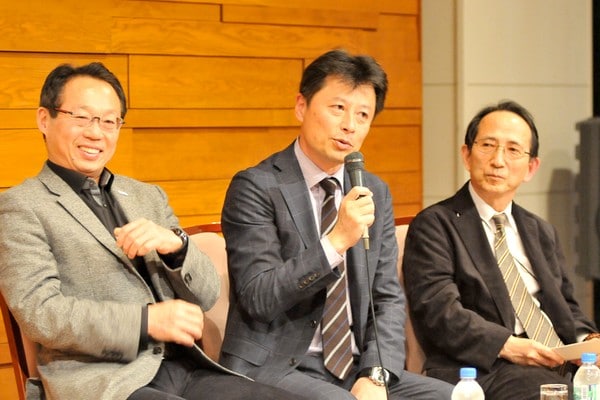
Yoo: I think that young Korean players have changed drastically since the 2002 World Cup. When I played in Japan, it was clear to me that Japanese players have better technique than Korean players. I tell my students to learn from other players’ strengths.
Ikeda: The training regimen in Korea was so outrageous that I was worried that the players would be destroyed. On the other hand, in Japan, the medical system has advanced so players can receive care immediately if they are injured. Due to Japan and Europe’s influence, Korea has adopted a similar system.
Ishikawa: Was there anything that you couldn’t get the Chinese team to grasp when you were directing them?
Okada: Changing their actions was difficult but there wasn’t anything that they didn’t understand. The first time I went to a team practice, the players were all sitting on the bench. Coming from Japan, I was used to seeing players kicking the ball around even before practice. Chinese players have to live in the team dorms and are strictly controlled. To them, soccer was a chore. I wanted them to experience the joys of being able to play soccer. Therefore, I let players leave the dorm when they wanted to and didn’t impose a curfew. I wanted them to think and act for themselves. Instead, there were many problems and some players were fired. However, the team changed in the second year. When I went to practice, all of the players were kicking the ball around.
Importance of Exchanges with Various Nationalities
Ishikawa: Listening to everyone’s thoughts makes me wonder if there needs to be a way to share these experiences beyond the sports world.
Okada: As Sang-chul said, you have to experience things for yourself in order to truly gain an understanding. A lot of Japanese people rely heavily on second- and third-hand information for understanding, but true knowledge is gained through real experience. I think nationalism—loving and taking pride in one’s own country—is important. The first time I took the field as the Japanese national team coach in our uniform and sang the anthem, it was a feeling that I still remember. But we have to understand that people in China and Korea love and take pride in their countries as well. That’s something that’s difficult to understand until you experience it yourself.
November 25, 2014—Opening up Future Possibilities through Stage and Video

